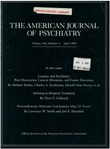Symptoms of schizotypal personality disorder
Abstract
The authors examined the symptoms of 35 patients with schizotypal personality disorder. In contrast to the suggestion, based on studies of nonclinical, familial samples, that patients with schizotypal disorder are best characterized by the negative symptoms of social isolation and impaired functioning, they found that the positive symptoms of odd communication, ideas of reference, magical thinking, and illusions were equally valid discriminators of their clinically based group of patients. The findings argue against the idea that schizotypal personality disorder be redefined in the revision of DSM- III (DSM-III-R) to emphasize negative symptoms and suggest that clinical samples of schizotypal patients may differ from familial samples.
Access content
To read the fulltext, please use one of the options below to sign in or purchase access.- Personal login
- Institutional Login
- Sign in via OpenAthens
- Register for access
-
Please login/register if you wish to pair your device and check access availability.
Not a subscriber?
PsychiatryOnline subscription options offer access to the DSM-5 library, books, journals, CME, and patient resources. This all-in-one virtual library provides psychiatrists and mental health professionals with key resources for diagnosis, treatment, research, and professional development.
Need more help? PsychiatryOnline Customer Service may be reached by emailing [email protected] or by calling 800-368-5777 (in the U.S.) or 703-907-7322 (outside the U.S.).



